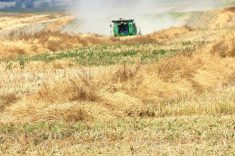A bill that would order U.S. officials to come up with a way to bring back mandatory country-of-origin labeling (COOL) on beef has been introduced in the U.S. House of Representatives.
Rep. Lance Gooden, a Republican from Texas, and Rep. Ro Khanna, a Democrat from California, on Wednesday introduced H.R. 7291, proposing to restore the word “beef” into existing labeling law under the U.S. Agricultural Marketing Act.
The bill, if passed and enacted, would give U.S. Trade Representative Katherine Tai and U.S. Agriculture Secretary Tom Vilsack up to 180 days to “determine a means of reinstating” mandatory COOL for beef in a way that’s “in compliance with all applicable rules of the World Trade Organization (WTO).”
Read Also

U.S. grains: CBOT soybeans, corn, wheat fall in USDA data aftermath
Chicago grains took a dive on Friday, following a closely watched U.S. government crop report and the release of export data that could provide clues into Chinese buying.
Tai and Vilsack would have up to a year from the date when the bill is enacted to “implement the means” to do so.
“American cattle ranchers are being undercut by foreign competition because current labeling standards allow imported beef to be marked as made in the United States if it is only packaged here,” Gooden said in a release Wednesday. “Our trade policies should promote American-made beef and put the hard-working cattle ranchers in the United States first.”
“It is critical that American consumers are able to make informed decisions about the meat they buy,” Khanna said in the same release. “Consumers should be able to know that they are truly supporting American farmers and ranchers from labels at the store.”
Groups including the U.S. Cattlemen’s Association and R-CALF USA also stated their support for the bill in Gooden’s release on Wednesday.
After its introduction Wednesday in the House of Representatives, the bill was referred to both the House agriculture committee and the House Ways and Means committee.
A nearly identical bipartisan bill, S. 2716, was introduced last fall in the U.S. Senate by Sen. John Thune, a Republican from South Dakota, and Sen. Cory Booker, a Democrat from New Jersey, among others.
That bill was introduced Sept. 13, read twice and referred that day to the Senate committee on agriculture, nutrition, and forestry and has yet to return.
Both of the bills specify restoring COOL for beef must be WTO-compliant, because beef was pulled from the relevant labeling legislation in 2015 after the WTO ruled that COOL violated the United States’ international trade obligations.
COOL was first developed during the Clinton administration, passed near the end of the George W. Bush administration in 2008 and implemented during the Obama administration in 2009. It imposed mandatory origin labels for beef, pork, lamb, chicken and goat meat and certain other perishable commodities where sold at retail in the U.S.
Canada and Mexico responded by challenging COOL at the WTO and in U.S. courts, because the COOL rules — as applied by Vilsack as the Obama administration’s ag secretary — called for U.S. processors of meat from imported animals to provide labels that detailed where the specific animals involved in a given package of meat were born, raised and slaughtered.
The costs involved in segregating animals and production lines to follow that label law prompted some U.S. packers and processors to restrict or halt their imports or cut the prices they paid for Canadian cattle and hogs. Some estimates pegged Canadian cattle and hog producers’ losses to reduced prices and lost sales at over $8 billion.
After the WTO’s 2015 ruling against COOL, the Obama administration repealed the label rules on beef and pork rather than face retaliatory tariffs from Canada and Mexico on U.S. goods.
Since then, according to Agriculture and Agri-Food Canada, language has also been included in the 2020 Canada-U.S.-Mexico Agreement (CUSMA) to require that each party ensures any regulations on labeling “accord treatment no less favourable than that accorded to like goods of national origin.”
Any rules on labeling that any of the CUSMA free trade bloc members impose in the future also must “not create unnecessary obstacles to trade between the parties.” — Glacier FarmMedia Network















